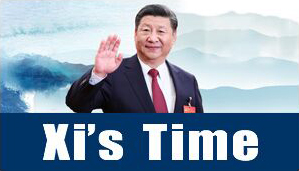BEIJING, Feb. 4 (Xinhua) -- Since the introduction of Xi Jinping Thought on Culture in October 2023, "culture" has become a buzzword throughout China.
In January, a key policy meeting on public communication hailed Xi's cultural thought, stating that it "provides solid ideological guarantees, powerful inspiration, and favorable cultural conditions to make China a stronger country and rejuvenate the Chinese nation on all fronts."
Under Xi's leadership, the Communist Party of China (CPC) is drawing on culture to enhance its governance and drive China's modernization.
How has Xi's cultural upbringing shaped his character?
Xi was born in 1953 into a family of revolutionaries. As a child, he was greatly inspired by China's traditional culture. He said he would never forget the story of Yue Fei, as told by his mother. Yue was a patriotic military commander from the 12th century whose mother tattooed "serve the country with the utmost devotion" on his back, a phrase that embodies "Zhong," or loyalty, in Confucian philosophy. Xi made it his life's goal to follow this motto.
Xi has mentioned that reading is his favorite hobby. His school teachers remember him as an exceptional student with a passion for reading classical literature, particularly as a fan of Du Fu, a renowned realist poet from the Tang Dynasty (618-907).
In the late 1960s, Xi was dispatched from Beijing to Liangjiahe, a small village in Shaanxi Province on the Loess Plateau, as an "educated youth" to engage in arduous farm labor. Hauling a whole box of books to the village, Xi immersed himself in a diverse reading journey, exploring works from Chinese literary masterpieces to those of Shakespeare and Tolstoy, and from Chairman Mao's "Serve the People" to Karl Marx's "Das Kapital."
Some 40 years later, the man who used to read late into the night under the dim glow of a kerosene lamp in a cave dwelling stood at a podium in the UNESCO headquarters as the president of China, sharing his views on culture and civilization. "He drew on famous poets and writers to highlight his country's long history and the importance of cultural diversity," according to media reports.
Xi refers to Liangjiahe as his "university" where he learned China's traditional virtues. Throughout his seven years in this village, Xi endured a challenging life, and shared work and meals with the poor locals. He vividly remembers the villagers' generosity, as they imparted valuable lessons about life and work and shared whatever little they had.
In return, Xi extended the same kindness. He shared his rations to help those in need, offered his spare shoes to a younger villager without any, gave his hat to someone lacking one in cold weather, and generously gifted books and notebooks to those who cherished reading and learning. The villagers used "Ren Yi," or benevolence and righteousness, the highest standards of traditional moral uprightness, to praise the young man.
Farmer Liang Yujin, now in his 70s, reminisced about making unannounced visits to Xi on four occasions after Xi had left Liangjiahe. Already a high-ranking official, Xi welcomed Liang into his home, and they ate meals prepared by his wife, Peng Liyuan. Liang brought millet, pumpkins, and sweet potatoes for Xi, and in return, Xi offered him tea and pastries. "He asked about every family in the village," Liang said.
In 1982, Xi started working in Zhengding, a historical county in Hebei Province, first as deputy Party chief and then as Party chief. After discovering two ancient locust trees in his workplace, he had them verified for age and fenced off for protection. He also initiated a comprehensive survey of cultural relics throughout the county, and holistic conservation efforts began.
Xi's profound passion for history and culture was so intense that, at one point, he considered pursuing archaeology; however, this interest extended beyond mere personal fascination.
He often shares an ancient Chinese proverb with officials and foreign friends, advocating the use of history as a compass for present and future endeavors. He believes that drawing lessons from tradition is instrumental in formulating policy decisions.
Situated in Zhejiang Province, the archaeological ruins of Liangzhu, now a UNESCO World Heritage Site, were surrounded by mining fields in the early 2000s. The excessive industrial dust and noise pollution transformed the entire area into what Jiang Weidong, an official from the site's management committee, described as "something like a war zone."
Upon learning about this situation in July 2003, Xi, then Party chief of Zhejiang, promptly ordered the closure of the mines. His dedication toward Liangzhu endured throughout the subsequent decades. As archaeologists confirmed the significance of Liangzhu as a testament to 5,000 years of Chinese civilization, he gave meticulous instructions for its protection. In his congratulatory message to the inaugural Liangzhu Forum last year, Xi hailed the site as a treasure of world civilizations.
Since taking on the Party's leading role -- general secretary of the CPC Central Committee -- in 2012, Xi has issued over 170 significant instructions regarding cultural relics, archaeology, and intangible cultural heritage. He has also conducted over 100 on-site inspections of historical and cultural sites.
Xi also harbors a deep love for "Red Culture." Over the years, he has visited almost every significant historical site related to critical chapters of the revolutionary past. These locations include a lake in Zhejiang, where the first CPC National Congress was held in 1921, and Fragrant Hills in suburban Beijing, where elder Party leaders laid the foundation for the establishment of New China.
"While journeying toward success, remember where we came from," Xi said.
He is a fan of rich human cultures. Speaking about his extensive travels across the world, Xi said, "Delving into the diverse civilizations across the five continents brings me the utmost joy."
Since assuming the presidency, Xi has visited over 70 countries. In Greece, he discussed an ancient Chinese phrase about stopping wars and Athena's contemplation of war and peace. He drew parallels between Chinese tea and Belgian beer in Belgium, highlighting the value of appreciating different cultures. In Mexico, he showed keen interest in the similarities between elements of the Maya civilization and Chinese elements like the dragon. In the Luxor Temple in Egypt, he spoke about the origins and developments of ancient civilizations.
Xi also shared personal reflections on literature, such as his impressions of Ernest Hemingway's "The Old Man and the Sea" and his experiences visiting places associated with Hemingway in Cuba.
People familiar with Xi say that his cultural upbringing has profoundly influenced his strong sense of idealism and his pragmatic approach to work. He often refers to the philosophy of "Zhi Xing He Yi," or "unity of knowledge and action," advocated by the ancient Chinese philosopher Wang Yangming (1472-1529), and considers it an essence of traditional Chinese culture. ■




